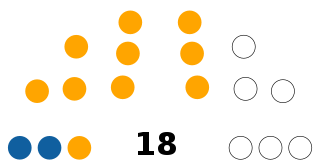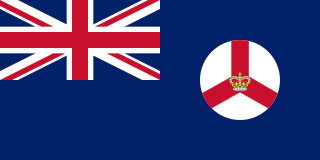Humans have inhabited present-day Niger since prehistoric times, with evidence of early activity dating back 60,000 years. The region hosted ancient rock carvings and pastoral communities from 7,000 BCE. Once fertile, it supported large settlements and cattle herding until the climate became arid around 2500 BCE.
The History of Benin since the 16th century, for the geographical area included in 1960 in what was then called the Republic of Dahomey before becoming the People's Republic of Benin.
High commissioner is the title of various high-ranking, special executive positions held by a commission of appointment.

The Fifth Republic is France's current republican system of government. It was established on 4 October 1958 by Charles de Gaulle under the Constitution of the Fifth Republic.

French Sudan was a French colonial territory in the Federation of French West Africa from around 1880 until 1959, when it joined the Mali Federation, and then in 1960, when it became the independent state of Mali. The colony was formally called French Sudan from 1890 until 1899 and then again from 1921 until 1958, and had a variety of different names over the course of its existence. The colony was initially established largely as a military project led by French troops, but in the mid-1890s it came under civilian administration.

French West Africa was a federation of eight French colonial territories in West Africa: Mauritania, Senegal, French Sudan, French Guinea, Ivory Coast, Upper Volta, Dahomey and Niger. The federation existed from 1895 until 1958. Its capital was Saint-Louis in Senegal until 1902, and then Dakar until the federation's collapse in 1960.

The National Assembly is the lower house of the bicameral French Parliament under the Fifth Republic, the upper house being the Senate. The National Assembly's legislators are known as députés, meaning "delegate" or "envoy" in English; etymologically, it is a cognate of the English word deputy, the standard term for legislators in many parliamentary systems.

The Senate is the upper house of the French Parliament, with the lower house being the National Assembly, the two houses constituting the legislature of France. It is made up of 348 senators elected by part of the country's local councillors in indirect elections. Senators have six-year terms, with half of the seats up for election every three years. They represent France's departments (328), overseas collectivities (8) and citizens abroad (12).

Jacques Chaban-Delmas was a French Gaullist politician. He served as Prime Minister under Georges Pompidou from 1969 to 1972. He was the Mayor of Bordeaux from 1947 to 1995 and a deputy for the Gironde département between 1946 and 1997.

Michel Jean-Pierre Debré was the first Prime Minister of the French Fifth Republic. He is considered the "father" of the current Constitution of France. He served under President Charles de Gaulle from 1959 to 1962. In terms of political personality, Debré was intense and immovable and had a tendency to rhetorical extremism.

France is a unitary semi-presidential republic with a bicameral legislature. Public officials in the legislative and executive branches are either elected by the citizens or appointed by elected officials. Referenda may also be called to consult the French citizenry directly on a particular question, especially one which concerns amendment to the Constitution.

The National Assembly is the unicameral legislative house of the Parliament of Mauritania. The legislature currently has 176 deputies, elected for five-year terms in electoral districts or nationwide proportional lists.

The Senate is the upper chamber of the bicameral Parliament of Madagascar. The Senate has 18 members: 12 are indirectly elected, one from each of the 22 regions of Madagascar, and 6 are appointed by the President.

The Colony of Singapore was a Crown colony of the United Kingdom that encompassed what is modern-day Singapore from 1946 to 1958. During this period, Christmas Island, the Cocos (Keeling) Islands, and Labuan were also administered from Singapore. Singapore had previously been established as a British colony since 1824, and had been governed as part of the Straits Settlements since 1826. The colony was created when the Straits Settlements was dissolved shortly after the Japanese occupation of Singapore ended in 1945. The power of the British Government was vested in the governor of Singapore. The colony eventually gained partial internal self-governance in 1955, and lasted until the establishment of the State of Singapore in 1958, with full internal self-governance granted in 1959.

The Union for the New Republic was a Gaullist political party in France, formed in support of Charles de Gaulle in the 1958 elections.

Elections were held on municipal, provincial, republican and federal levels in Yugoslavia from its foundation in 1918 throughout its breakup in 1992.
Local elections were held in Serbia over two rounds on 3 November and 17 November 1996, concurrently with the 1996 Vojvodina provincial election. The first day of voting also coincided with the 1996 Yugoslavian parliamentary election and the 1996 Montenegrin parliamentary election. This was the third local election cycle held while Serbia was a constituent member of the Federal Republic of Yugoslavia and the last time that Serbia oversaw local elections throughout Kosovo and Metohija until its controversial decision to hold elections in 2008.

In France, a mayor is chairperson of the municipal council, which organises the work and deliberates on municipal matters. The mayor also has significant powers and their own responsibilities, such as the responsibility for the activities of municipal police and for the management of municipal staff.

The president of France is elected by direct popular vote to a five-year term. If the office falls vacant before the end of five years, an election to a new five-year term is held, generally within 20 to 35 days of the vacancy.













